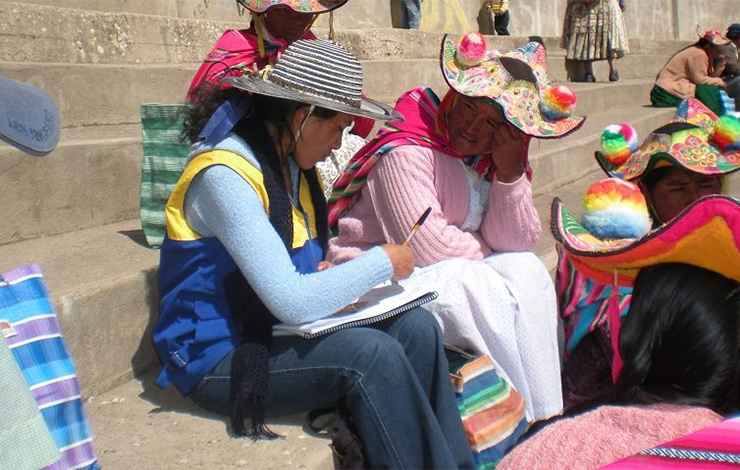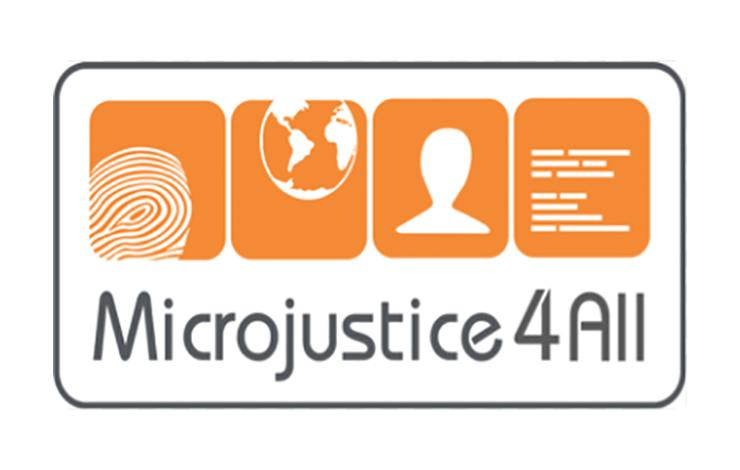Women and children in the slums of Nairobi lack access to the legal services and documentation needed to access education, healthcare, and to protect their small businesses and property rights. To protect their rights and prevent violence and intimidation, Microjustice4All conducted a legal needs assessment, trained legal professionals, and created a toolkit with information on birth certificates, cohabitation contracts, inheritance proceedings, land and housing registration, registration of women’s businesses, access to microfinance, and social benefits.
Challenge

While many rule of law and justice programs focus on top-down institutional reform, the biggest challenge lies in implementation and the generation of impact on the ground. Microjustice Kenya (“MJK”) is part of the unique network of Microjustice Country Organisations of Microjustice4All. This network develops innovative methods in legal service provision to the poor, addressing the following challenges:
- Exclusion in society reducing equal access to social benefits;
- Lack of capacity for legal professionals to build their own practices;
- Lack of awareness regarding the rule of law;
- Weak legal system at the grassroots level;
- Challenges to funding any model that supports access to social benefits through legal services.
The challenge of legal service delivery is especially important for the protection of excluded groups, such as women and children. Providing them with the correct legal paperwork creates the preconditions for access to education, finance, healthcare, protection of property rights and small business, and legal security. Therefore Microjustice Kenya's program used simple legal solutions to help excluded groups meet basic legal needs, participate in society and develop themselves socio-economically. The program provided legal services to beneficiaries to help obtain legal documents with a focus on:
- Birth certificates and various civil documents to enable access to education, healthcare, social benefits, microfinance and voting;
- Housing and land registration for property protection, access to collateral and investment opportunities;
- Setting up businesses, cooperatives and other legal entities, and drafting contracts to increase income-generating activities and civil society participation; and
- Legal issues related to the above, mostly related to family law and inheritance matters (child support, partnership contracts, wills).
Program Summary
At the end of 2011, MJK conducted activities on a pilot scale in the slums of Nairobi, primarily focusing its standardized set of products on civil registration, most notably birth certificates. Recently, MJK has started to expand its product portfolio related to group registration services; enabling women and youth to access government funds under the new constitution. MJK noticed there is a strong need to address the particular legal needs of women and children, as they form a vulnerable group that lacks sufficient legal protection and security. This makes them easy targets for abuse by authorities and domestic violence and intimidation, which prevents them to develop fully.
MJK proposes to develop a tailor-made Microjustice Toolkit for Women and Children with standardized legal services to access and protect their fundamental rights. This Toolkit will prevent violence and intimidation of women and children, and give them protection and opportunities under the rule of law. For example, having a registered marriage or partnership, and recognized and registered property both in the woman’s and the man’s name will prevent women and children from being expelled from the house and land after their husband passes away or leaves the family. It gives women and children the right to inherit property and secure their lives. With limited costs and efforts, the Microjustice Toolkit for Women and Children can be replicated to other geographic areas in Kenya. It can also easily be developed into Toolkits for other target groups. Furthermore, by sharing the Microjustice Toolkit for Women and Children with other Country Organizations, the toolkit and methods can be replicated to countries all around the globe.
MJK completed the following program:
- Conduct a brief assessment on the particular legal needs of women and children in the slums of Nairobi. With the existing experience and presence of MJK, a cost-effective short survey will do.
- The Microjustice Toolkit for Women and Children will be developed as a tailor-made kit with a specific focus on safeguarding women’s and children’s rights, e.g. birth certificates, civil documentation, cohabitation contracts, inheritance proceedings, land and housing registration, registration of women’s associations, businesses, access to microfinance and social benefits.
- Products and services will be distributed through the outlets and the main office in the slums of Nairobi. This infrastructure will be set up in partnership with local church organizations, chief’s offices, and relevant organizations as umbrella SME organizations. A carrier-motorbike for ‘mobile’ service provision will also be provided at schools, hospitals et cetera.
- Training of legal professionals will aid local capacity building.
- Hands-on, impact-oriented legal education through a combination of awareness-raising activities with the provision of practical legal solutions by its lawyers and paralegals on the ground
- The work on the ground will generate insights into implementation obstacles, which will be used for evidence-based lobbying for institutional reform.
- Any other ways of raising awareness.
Impact
Within one year, the program will aim to achieve the following results:
- Development of one Microjustice Toolkit for Legal Empowerment of Women & Children with a minimum of 6 Microjustice products;
- Reach > 10,000 women and children in the slums of Nairobi through outreach activities, trainings and an awareness-raising campaign;
- Train > 10 paralegals and young professionals of partner organizations and universities;
- >3,000 consults provided;
- >1,000 cases solved; and
- At least one proposal for removing obstacles in the implementation and institutional reform and policies.
This will impact the following Rule of Law Index factors and subfactors:
Factor 3 Order and Security -
- Civil conflict is effectively controlled: Correct legal paperwork creates legal security, preventing conflict.
- People do not resort to violence to redress personal grievances: By helping women and children to formalize their socio-economic situation and find protection and opportunity in the legal system, they are empowered to defend and develop themselves and escape from domestic violence and intimidation.
Factor 4 Fundamental rights -
- Equal treatment and absence of discrimination: Women and children are particularly vulnerable under the law. Legal empowerment will enable them to live on an equal basis and to fight discrimination peacefully.
- The right to life and security is effectively guaranteed: As correct legal paperwork, such as birth certificates and civil documentation, is a precondition to inclusive socio-economic development., access to these will guarantee the right to life and security of beneficiaries.
- Fundamental labour rights are guaranteed: By providing women and children with civil documentation, enabling access to education, social protection for workers, medical care, health insurance and pensions, the commitments under the ILO standards will be guaranteed.
Factor 5 Open government -
- All subfactors: The evidence-based lobbying of MJK aims to remove obstacles that de facto deny women and children access to public services and socio-economic development. With this bottom-up approach, it enhances open government by removing bottle-necks.
Factor 7 Civil justice -
- People can access and afford justice: By distributing simple and affordable legal solutions, and conducting awareness-activities through existing infrastructure close to the target groups (e.g. church organisations, chief’s compound, schools, microfinance outlets), beneficiaries secure direct access without having to make costly and long travels to and from government institutions to execute their rights.
- Civil justice is free of discrimination: By developing a tailor-made Microjustice Toolkit for Women & Children, the vulnerable and excluded groups of poor women and children in the Nairobi slums will be treated on equal basis as men and others with higher incomes.
Factor 9 Informal justice-
- All subfactors: The Toolkit will be developed on the basis of a legal needs assessment that also addresses the local informal legal framework in the context of fundamental human rights. The obstacles encountered during distribution (case solving) will be used for evidence-based lobbying for institutional and policy reform.
Partners
Partners include:
- Microjustice4All – supervision and technical support of the program
- Microjustice Kenya – implementation of the program
- Church organisations in the Nairobi slums – outlets for service provision and legal education (in church service)
- Chief: The Chief’s compound provides Microjustice with outlets (paralegal’s office) and large meetings on Microjustice for women and children that will be organised by the Chief
- Local Government (Civil Registry, and other relevant institutions): cooperation for solving the cases and institutional reform
- Schools and NGOs: reaching the target groups for service provision and awareness-raising
- Private sector – for reaching the women in the context of economic development
- International Development Organisation – cooperation in product development and evidence-based lobbying


